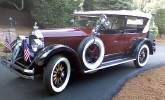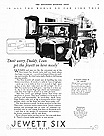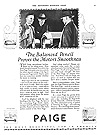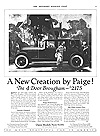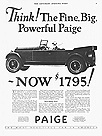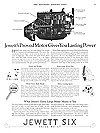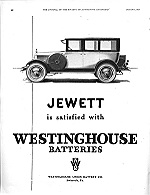| < 1923 | 1925 > |
1924
| Nameplate: | Paige | Jewett |
| Model: | 6-70 | 18-22 |
| Cylinders: | 6 | 6 |
| Horsepower SAE: | 75 | 50 |
| Wheelbase: | 131 | 112 |
The new Jewett plant was in operation when the 1924 model year began, so Paige auto production could be greatly enlarged. According to ad copy of the day, during 1923 it had been possible to build only about twenty-five Paiges each day because of the Jewett demand. In 1924 Paige capacity was one hundred vehicles each day, which permitted significant price reductions. For example, the prices of both phaetons were reduced to $1,995 from $2,450.
- Paige
The brougham featured a commodious, leather-finished touring trunk at the back, oval windows in the rear quarter panels, and a maroon body with black running gear and black fine-grain leather finish on the upper rear quarter of the body. The most obvious differences between the standard and deluxe cars were the bumpers, motometer and a spare tire and rim mounted on the left. The customer could order steel disc wheels on any model for just $35 more.
- Jewett
The Jewett remained quite popular. Paige-Detroit had sold 65,000 since its 1922 introduction. During the year Jewett dropped the roadster and added a coupe and a two-door, five-passenger brougham. The brougham included a roomy trunk at the rear as standard equipment. The sales catalog extolled a very special feature of this model: "Another brougham feature of interest to the tourist is its ready adaptability for sleeping purposes. The rear seat back may easily be lifted out and arranged with the other cushions to make a comfortable bed for two. It's just the work of a few minutes to make a serviceable bed in the Brougham." The catalog even had a cutaway drawing showing two occupants asleep.
In March of 1924 Paige announced Paige-Hydraulic 4-wheel brakes. The company had obtained a Lockheed license in 1920, but it did not install the brakes on autos immediately. Instead, Paige-Jewett engineers conducted tests and modified the brakes as necessary. The company claimed it did not want to rush them into production before they met Paige standards: "Always proving before approving. Never passing experiments on to the public." At first hydraulic brakes were an option but became standard with 1926 models.
A company brochure, which showed Paige and Jewett owners and admirers around the country, included Miss Wheeling (Miss Mary Dague) and Miss Detroit. Also, one of best-remembered Paige ads, The Balanced Pencil Proves the Motor's Smoothness, appeared in the February 2, 1924 issue of The Saturday Evening Post magazine. The ad dared readers to try balancing a pencil on end right on top of the radiator cap, then speed the engine up. The pencil would not fall! Paige prided itself on its engine's quietness and smoothness.
Paige regarded itself as a maker of autos in the middle of the price range. However, Maxwell-Chalmers raised the threshold with a new model that had a high-compression, six-cylinder motor with a seven-bearing crankshaft, a carburetor air cleaner, a replaceable oil filter, and four-wheel hydraulic brakes. It was named Chrysler, after the company manager who held a controlling interest. Customers bought 32,000 during the course of the year.
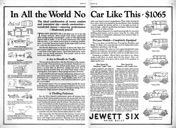 |
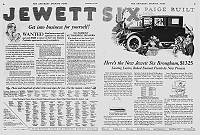 |
| In All the World No Car Like This - $1065, MoToR, January, 1924 | 1924 Jewett models, Saturday Evening Post Magazine, September 29, 1923 |
 |
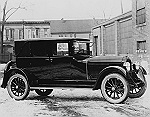 |
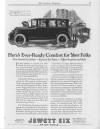 |
| 1924 6-70 Touring, LeMay Collections at Marymount, Tacoma, Washington (Mike Thompson Photo) | 1924 6-70 Brougham (AACA Library photo) | Here's Ever-Ready Comfort for Your Folks, American Magazine, 1924 |
Elsewhere in 1924:
- Vincent Bendix markets a four-wheel brake system.
- Purolator develops an automotive oil filter.
- Walter Chrysler of Maxwell builds a medium-priced car with his name on it.
- Nash installs electric clocks in its dashboards.
- Henry Ford lowers the price of his Model T to $290.00
| < 1923 | 1925 > |
